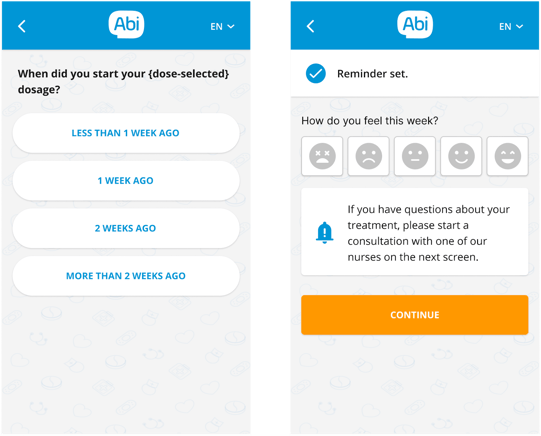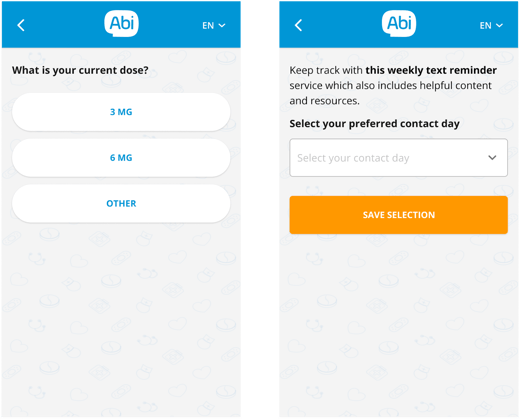Are Patient Support Hubs Still Effective in Overcoming Treatment Non-Adherence?

Ensuring patient adherence to prescribed treatments is crucial for successful outcomes in the Life Science industry.
At Abi Global Health, we recognise the challenges associated with non-adherence, a critical problem in the patient journey.
To enhance adherence rates, Life Science companies must examine reasons for patient non-adherence and assess the effectiveness of current support programmes.
Causes of Treatment Non-Adherence Attributed to Patients
Non-adherence to treatment regimens poses a significant challenge, potentially compromising patient outcomes and impeding pharmaceutical companies' ability to fulfil their treatment promises.
Fear of side effects emerges as a prominent factor contributing to non-adherence. Some patients, alarmed by the possibility of side effects, may prematurely discontinue their treatment. Others, influenced by disinformation campaigns or mistrust in pharmaceutical companies, may avoid medication altogether.
Another key driver of non-adherence is the complexity of treatment regimens. Patients facing intricate regimens, whether due to a hectic lifestyle, cognitive impairments, or language barriers, are more likely to struggle with adherence. Complex instructions, multiple medications, and cultural differences can contribute to confusion and hinder patients' ability to follow their prescribed treatments accurately. Lack of real-time guidance or support, such as having a nurse on standby, further exacerbates the challenge, emphasising the need for personalised and accessible assistance to enhance treatment adherence.
Moreover, patients may discontinue treatment due to a perceived lack of immediate benefits, driven by unrealistic expectations or a misunderstanding of the gradual effect of certain treatments. Effective communication, patient education, and ongoing support from healthcare providers become crucial in managing expectations, emphasising the progressive nature of treatment, and fostering a patient-centric environment.
In essence, these factors collectively underscore the significance of education and personalised support as pivotal elements in addressing non-adherence issues. By focusing on these aspects, Life Science companies can intervene to offer tailored solutions that empower patients to adhere to their treatment plans effectively.
Effectiveness of Patient Support Hubs
In response to the complex issue of patient non-adherence, various patient support programmes (PSPs) have emerged, aiming to enhance the effectiveness of treatment adherence strategies. These programmes typically offer comprehensive hubs that provide educational resources, medication reminders, and personalised assistance to address patient concerns.
However, while these initiatives offer valuable information and some degree of personalisation, there is recognition that existing patient support programmes may still fall short of fully addressing the diverse and nuanced reasons behind non-adherence.
Difficulty In Accessing Information
It is difficult for users to access the right information in the current models of patient support hubs. At times, a patient, a caregiver, or even a doctor may need to click on many links to find an answer in patient hubs.
A Systematic Literature Review of the Impact of Patient Support Programs in Europe also revealed that to reach the full potential of PSPs, methods have to be standardised and impact should be measured systematically – which includes the user experience and design. The review suggests that this can be done with the use of "new digital technologies that should be a priority for the different stakeholders involved in their design and implementation."
Lack of Personalisation and Cross-Disciplinary Support
A patient’s concern may also be very specific to his or her condition and it is almost impossible that a website can hold all the answers to a rather personal situation.
A study published in the Journal of Medical Internet Research on the Development of a Personalised Digital Health Hub for Hip-Fracture Patients stated that the current model of hubs approach patients as isolated individuals. “We need to consider them in the context of a network of caregivers and delivery of service as an integrated holistic model of care,” the study states.
Biopharma companies are realising the need for personalisation and rapidly advancing capabilities through partnerships to move from a traditional, one-size-fits-all patient support model to a personalised, 1:1 patient support model. In fact, 97% of biopharma companies plan to invest in personalising patient care in the next two years.
So what does an effective patient support programme look like? What components should it have?
A Holistic Patient Support Programme To Address Treatment Non-Adherence
At Abi Global Health, we have observed that treatment adherence is significantly improved for clients who implement an engaging and bespoke patient support programme. A good example is the support programme of a leading global pharma client. The brand’s primary objective was to increase adherence and reduce the time between dose increases, as per the label. Although the client aimed for a 13% improvement compared to the control, the study results revealed that we surpassed this goal by more than double, with statistically significant outcomes across all parameters.
To achieve this result, the effectiveness of our programme lies in these components:
On-Demand Access To A Range of Specialists
While the Abi platform doesn't replace patients’ primary healthcare providers, patients with chronic diseases often need access to different specialists that are available through Abi. Patients may need a cardiologist one day and a nutritionist on another day. In these circumstances, patients can quickly ask an Abi network doctor simple and immediate questions about their treatment instead of waiting days for another appointment.
The Abi platform makes sure that patients are connected to doctors with the right specialisation within 40 seconds or less. This is made possible through Abi’s global network of HCPs of varying specialisations – including but not limited to nutritionists, oncologists, behaviourists, etc. This paves the way for integrated care.
The Abi Global Health team engages healthcare professionals (HCPs) on a demand-driven basis. For instance, if a pharmaceutical brand requires 200 pulmonologists for a specific patient support programme, our team ensures the requested expertise is provided.
Easy-To-Use Interface
With Abi, patients can use a bespoke web app or digital companion app made available by the pharma brand which patients are already using as part of their treatment.

The user interface can also be customised based on the preferences of the pharma brand.
Side effect management
An important feature of patient support programmes is side effect management — this tells patients what is normal and what needs urgent attention. This feature can also include information on how to easily manage side effects should patients encounter them during the course of treatment.
Medication Reminders
The Abi platform can also send patients medication reminders to help them stay on track with treatment. 
The Abi platform has 3x more user engagement compared to traditional telemedicine providers.
When patients are empowered with relevant and personalised information about their condition, they can make better, well-informed decisions moving forward.
For Life Science companies that are ready to enhance patient adherence and improve health outcomes, simply connect with Abi Global Health to delve deeper into innovative solutions addressing treatment non-adherence. Our expertise in developing bespoke patient support programmes that incorporate on-demand access to healthcare professionals can empower your organisation to deliver meaningful impact. Book a demo with us if you want to learn more about these innovative solutions.
Dr. Victor Vicens,Victor is the Chief Medical Officer and Co-Founder of Abi.As our Chief Medical Officer, Victor ensures the quality and breadth of the Abi healthcare professional network is world-class in all our local markets. Victor co-founded Abi based on insights gained from over 18 years of healthcare and digital transformation experience. His background includes practising roles as a resident physician & consultant psychiatrist. He is a veteran of previous medtech startups and has advised insurance and pharmaceutical companies on remote medicine and digital transformation. He holds medical degrees at undergraduate and masters levels, a Ph.D in neuroimaging, along with several publications in the field of psychosis and neuroimaging, and was a research fellow at Mount Sinai School of Medicine in NYU.


